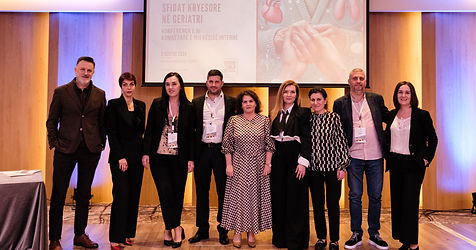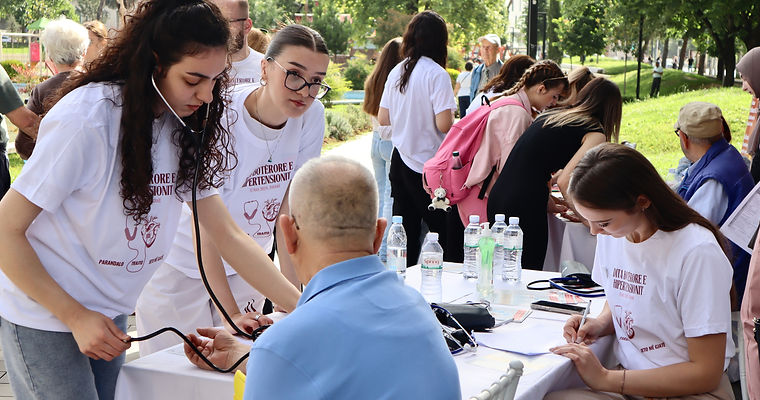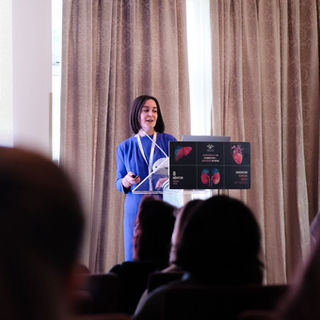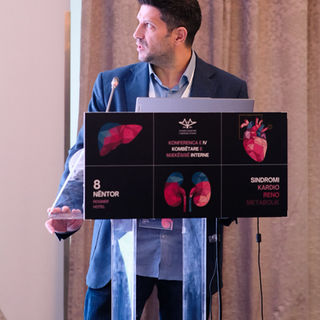Welcome greetings
President of the Albanian Society of Internal Medicine
Prof. Dr. Margarita Gjata Resuli
Distinguished guests, esteemed participants!
It is a special pleasure for me to welcome you to the 3rd Conference on Internal Medicine with the theme: “Key Challenges in Geriatric: Pathways and Crossroads Towards Healthy Longevity”.
The selection of this theme by our Association is not coincidental and serves an important purpose. As the Internal Medicine Service, we have observed with concern that the number of elderly patients is significantly increasing. Moreover, they present multiple compromised parameters due to the comorbidities carried by this population group. These data reveal deficiencies in treatment and follow-up, highlighting the need for significant improvement. The increase in life expectancy, while an important achievement for our society, also demands a deep analysis of the medical and social challenges that this development continually presents to us. Therefore, it is a difficult task for me to stand before you today, as we gather to address some of the most pressing challenges facing us and our society, not only in Albanian but beyond.As is wellknown, the aging population is growing at an accelerated pace. By 2030, the prevalence of the elderly population is expected to rise to 20%, compared to 13% today. This demographic shift has posed numerous significant medical and social challenges to society as a whole. One of the primary challenges we face is the complex healthcare needs of the elderly. Many of our patients deal with multiple chronic illnesses, requiring us to address the complications of polypharmacy, care coordination, and management of comorbidities. It is essential that we adopt a comprehensive approach to address not only the physical health but also the emotional, social and psychological needs of older individuals. Caring for geriatric patient is not merely a profession; it is a calling to enhance the quality of life for elderly while preserving their dignity and well-being.Let us make this conference a platform for collaboration and innovation, paving the way for a better future for geriatric care. Together, we can make a significant impact on the lives of those we serve, while also broadening the perspective of policymakers by presenting them with a clear picture of the near future and our vision for addressing these major challenges facing human society!


















17 Maj – Dita Botërore e Hipertensionit Arterial
Hipertensioni arterial përfaqëson "vrasësin e heshtur" më të rrezikshëm, pasi rrallëherë prania e tij shoqërohet me simptoma të qarta apo shqetësime të rëndësishme që tërheqin vëmendjen. Ndërgjegjësimi publik përbën çelësin e artë për diagnostikimin e hershëm, mbajtjen nën kontroll dhe uljen e komplikacioneve të rënda kardiovaskulare, cerebrale apo sistemike. Hipertensioni është i pranishëm në 1 në 4 të rritur. Prevalenca e hipertensionit rritet me moshën: është 22.4% në moshën 18-39 vjeç, 54.5% në moshën 40-59 vjeç dhe 74.5% mbi moshën 60 vjeç.
Shoqata e Mjekësisë Interne, Instituti i Shëndetit Publik me mbështetjen e studentëve të Fakultetit të Mjekësisë organizuan këtë fushatë depistimi dhe ndërgjegjësimi me qëllim që, përveç diagnostikimit dhe trajtimit të hershëm, të modifikohen faktorët e riskut për HTA si stili i jetesës, mbipesha, inaktiviteti fizik, stresi, pirja e duhanit dhe konsumimi i tepërt i alkoolit.
Kjo fushatë në Ditën Botërore të Hipertensionit le të shërbejë si thirrje për publikun që të ketë prioritet shëndetin kardiovaskular dhe të ndërmarrë hapa proaktivë për të parandaluar komplikimet e lidhura me hipertensionin. Sot, në Ditën Botërore të Hipertensionit, ritheksojmë se matja e saktë e presionit arterial, kontrolli dhe trajtimi i duhur i tij janë domosdoshmëri për të jetuar shëndetshëm dhe gjatë.
Në këtë ditë, nga Shoqata e Mjekësisë Interne dhe HTA, u organizua edhe konferenca me tematikë: “Hipertensioni; Parandalim, trajtim në kohën e duhur. Jeto shëndetshëm dhe më gjatë.” Të gjitha temat e referuara në konferencë lidheshin me hipertensionin arterial, të dhëna aktuale mbi HTA në Shqipëri, monitorimin dhe faktorët e riskut të lidhur me të, rëndësinë e diagnostikimit dhe trajtimit të tij, relacionin dhe specifikat e tij në patologjitë bashkëshoqëruese si diabeti mellitus, sëmundja renale kronike, etj., si dhe format sekondare të tij.
Konferenca ishte një tryezë e hapur diskutimesh për të mundësuar më tej bashkëpunimin tashmë të instaluar midis Shërbimit të Mjekësisë Interne dhe HTA, dhe mjekëve të shërbimit primar, pasi janë ata përballja e parë me pacientin.





4th National Conference of Internal Medicine
Focus: Cardio-Renal-Metabolic Syndrome
The 4th National Conference of Internal Medicine brought together leading clinicians, researchers, and healthcare professionals for a day of scientific exchange and collaboration. Organized under the theme “Cardio-Renal-Metabolic Syndrome”, the event highlighted one of the most complex and rapidly evolving areas of modern internal medicine, marking what many consider a new era in Internal Medicine.
Throughout the conference, participants engaged in expert-led sessions exploring the interconnected mechanisms linking cardiovascular disease, renal dysfunction, and metabolic disorders. Presentations showcased the latest clinical evidence, advanced diagnostic tools, and innovative therapeutic strategies aimed at improving care for patients affected by this multifaceted syndrome.
The conference served as a key platform for strengthening multidisciplinary cooperation among cardiologists, nephrologists, endocrinologists, and internists. It fostered meaningful networking, knowledge exchange, and the development of new collaborations within the medical community.
By emphasizing scientific rigor, integrated treatment approaches, and emerging clinical insights, the event reflected a forward-looking vision—one that truly embodies a new era in Internal Medicine.














